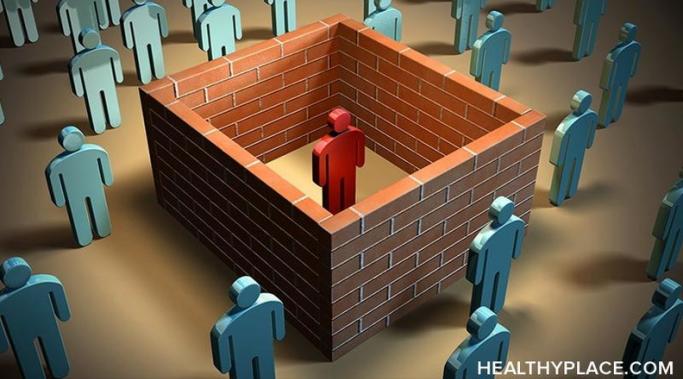Blogs
There are so many things that I want to do during the day but I can’t do them due to the invisible barrier of bipolar disorder. When I try to explain that to people, it’s almost impossible. I just can’t do things. It’s like I’m weighed down with 1000s of pounds. There’s an invisible barrier that bipolar disorder erects between me and what I want to do.
It's so hard living with chronic pain--something that people can't see from the outside--and constantly feeling the need to justify how you feel or act towards others. Being someone with both mental and physical health problems have left me on a rollercoaster of never feeling like I'm good enough.
My life with social anxiety disorder (SAD) isn’t much of a life. When faced with strangers, my social phobia causes me to avoid physical proximity, eye contact, and small talk. Though normally well-spoken, the attention of others causes me to stumble over my words. Thoughts of job interviews or parties send me into a panic. I am often frightened when faced with a crowd. Daily life with SAD is unnerving and often unpleasant.
Medication compliance for people taking psychiatric drugs is notoriously hit and miss. Because of that, the Food and Drug Administration (FDA) recently approved a form of aripiprazole (Abilify) that digitally tracks medication compliance in patients with schizophrenia, some forms of bipolar, and some cases of depression according to Psychiatric Times.1 A digital sensor in the pill tracks when the medication is ingested by sending a digital tracking signal to an arm patch. Information can be provided to patients and might be shared with families and providers. While this may be the first such drug approved by the FDA, it will not be the last. So, the question for mentally ill patients and their families is this: Is this a wonderful, new medication compliance tool, or is it a potentially dangerous invasion of privacy?
You have probably heard of the National Suicide Prevention Lifeline. What you might not know is that it is intended for anyone going through depression, even those who do not experience suicidal thoughts. The resource connects callers to local crisis centers where counselors are there to listen and provide support. Sometimes, just having someone there to listen can save a life and the National Suicide Prevention Lifeline can do that.
Anyone can help stop the stigma of substance abuse. A major obstacle to addiction recovery, stigma, is a set of negative beliefs that a group or society holds about a topic or group of people. Stigma results in prejudice, avoidance, rejection, and discrimination against people who have a socially undesirable trait such as drug abuse or addiction. In my own recovery process, I felt the stigma of substance abuse and it kept me from seeking help for many years.
The effects of posttraumatic stress disorder (PTSD) on relationships when both partners have PTSD create both problems and benefits. Living in the aftermath of trauma is difficult enough on its own, but navigating a relationship in which both partners have PTSD can be an emotional minefield. Fortunately, learning how to be in a relationship with someone who has PTSD is easier to understand when you live with PTSD too.
I have schizoaffective disorder plus general anxiety disorder. General anxiety may sound like a mild condition but, for me, it can be torture. When I’m feeling extremely anxious, I often hear voices. And when facing my anxieties triggers schizoaffective voices, it becomes very hard to cope.
If you’re facing depression during the holidays, this is an especially trying time. You’re already dealing with so much, and then you need to add in the shopping, decorating, and time spent being social. This year, I’ve decided to plan ahead so that I can be at my best to enjoy this most wonderful time of the year. Keep reading to discover eight tips for facing depression during the holidays.
Sometimes, knowing the main causes of anxiety isn't necessary. Sometimes, it's not even desirable because working to uncover the causes of your anxiety could do more harm than good. There are times, however, that knowing the main cause of your anxiety can be very helpful because it gives you something tangible to address. Let's look at two main causes of anxiety and discover how to remove them.










I believe she will only be able to rid herself of her demons, and hopefully her BPD as well, when she's ready to confront the abuse of her father. If she can put the blame where it belongs, she may stop projecting that victim/perpetrator cycle on the present men in her life. These demons are a metaphor for the purgatory she has created for herself. That reality has consequences in the real world, but it need not be real in the tangible sense. Exorcising her demons will require the expenditure of real physical energy and probably the destruction of aspects of her personality. If this ever happens, and it's possible but not probable, then these demons will evaporate. They are only as real as one's personality is real. In short, reality is not the question, it's what you make of the things you feel to be real.